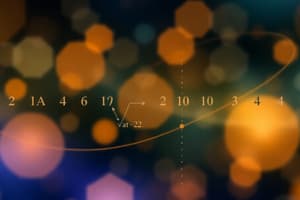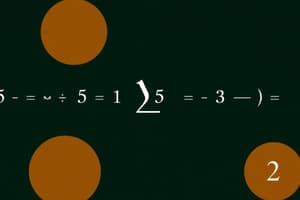Podcast
Questions and Answers
What is the notation for subset?
What is the notation for subset?
- ⊆ (correct)
- ≤
- <
- ⊂
Which of the following statements is true regarding the empty set and subsets?
Which of the following statements is true regarding the empty set and subsets?
- The empty set is not a subset of itself.
- The empty set is a subset of only finite sets.
- All sets are subsets of the empty set.
- The empty set is a subset of any set. (correct)
If A is a proper subset of B, what can we conclude?
If A is a proper subset of B, what can we conclude?
- There is at least one element in B that is not in A. (correct)
- A is a larger set than B.
- All elements of B are also elements of A.
- A and B have the same number of elements.
What is the cardinality of a set?
What is the cardinality of a set?
What does the symbol '∩' represent in set theory?
What does the symbol '∩' represent in set theory?
What does the notation 'A' represent in set theory?
What does the notation 'A' represent in set theory?
If A = {1, 2, 3} and B = {2, 3, 4}, what is A - B?
If A = {1, 2, 3} and B = {2, 3, 4}, what is A - B?
Which of the following diagrams is used to represent sets and their relationship?
Which of the following diagrams is used to represent sets and their relationship?
What is defined as a collection of definite and distinct objects?
What is defined as a collection of definite and distinct objects?
Which notation indicates that an element is not a member of a set?
Which notation indicates that an element is not a member of a set?
What is the definition of a null set?
What is the definition of a null set?
Which of the following sets consists of all natural numbers?
Which of the following sets consists of all natural numbers?
Which type of set has no common elements with another set?
Which type of set has no common elements with another set?
What does it mean if set A is a proper subset of set B?
What does it mean if set A is a proper subset of set B?
How is a singleton set defined?
How is a singleton set defined?
Which symbol represents a subset relation?
Which symbol represents a subset relation?
Flashcards
What is a Set?
What is a Set?
A well-defined collection of distinct and definite objects.
What are the elements of a set?
What are the elements of a set?
The objects that belong to a set.
What is a Null Set?
What is a Null Set?
A set with no elements, denoted by {} or ϕ.
What is a Singleton Set?
What is a Singleton Set?
Signup and view all the flashcards
What is a Finite Set?
What is a Finite Set?
Signup and view all the flashcards
What is an Infinite Set?
What is an Infinite Set?
Signup and view all the flashcards
What is a Universal Set?
What is a Universal Set?
Signup and view all the flashcards
What is a Subset?
What is a Subset?
Signup and view all the flashcards
What is a proper subset?
What is a proper subset?
Signup and view all the flashcards
What is the cardinality of a set?
What is the cardinality of a set?
Signup and view all the flashcards
What is the union of two sets?
What is the union of two sets?
Signup and view all the flashcards
What is the intersection of two sets?
What is the intersection of two sets?
Signup and view all the flashcards
What is the complement of a set?
What is the complement of a set?
Signup and view all the flashcards
What is the difference of two sets?
What is the difference of two sets?
Signup and view all the flashcards
What is a Venn Diagram?
What is a Venn Diagram?
Signup and view all the flashcards
What is the power set of a set?
What is the power set of a set?
Signup and view all the flashcards
Study Notes
Opening Prayer
- Opening prayer is a part of the lesson.
Mental Computations
- Mental computations are a part of the lesson.
Language of Sets (November 13, 2024)
- Sets are well-defined collections of definite and distinct objects.
- Set elements are the objects in a set.
- Sets are denoted by uppercase letters (e.g., A).
- Set elements are denoted by lowercase letters (e.g., x).
- x ∈ A means x is an element of set A.
- x ∉ A means x is not an element of set A.
Sets
- Sets are any well-defined collection of definite and distinct objects.
- The elements of a set are the objects within that set.
- Sets are usually denoted by uppercase letters, while elements are denoted by lowercase letters.
- The notation x ∈ A signifies that x is an element of set A.
- The notation x ∉ A signifies that x is not an element of set A.
Ways of Describing Sets
- Roster Method: Elements are directly listed within curly brackets.
- Example: A = {1, 2, 3, 4, 5, 6}
- Rule Method: Elements' characteristics or rules are described.
- Example: A is equal to the set of integers from 1 to 6
- Set Builder Notation: Combines rule and roster methods using a special format
- Example: A = {x | x ∈ Z, 1 ≤ x ≤ 6} this translates set A has integers x such that they are an element of set Z (integers) and 1 is less than or equal to X which is also less than or equal to 6.
Practice (Roster Method)
- {counting numbers less than 9} = {1, 2, 3, 4, 5, 6, 7, 8}
- {vowels of the word "family"} = {a, i, a }
- {days of the week beginning with letter T} = {Tuesday, Thursday}
- {letters of the word "mathematics"} = {m, a, t, h, e, m, a, t, i, c, s} Note the repeated letters are only listed once.
Practice (Rule Method Using Set Builder Notation)
- {Saturday, Sunday} = {x | x is a day of the week, starting with the letter "S"}
- {a, e, i, o, u} = {x | x is a vowel}
- {f, 1, 0, w} = {x| statement representing characteristics for the elements listed}
- {0, 1, 2, 3, 4} = {x ∈, Z, x ≥ 0 and x ≤ 4}
Kinds of Sets
- Null Set/Empty Set: A set with no elements, denoted by {} or Ø.
- Singleton Set/Unit Set: A set with only one element.
- Finite Set: A set containing a countable number of elements which can be listed.
- Infinite Set: A set with an uncountable number of elements, not possible to list all of them.
- Universal Set: A set containing all relevant elements or objects of consideration. All other sets considered are subsets of this set.
Other Special Sets
- Joint Sets: Sets with common elements.
- Disjoint Sets: Sets with no common elements.
- The set of natural numbers (N) = {1, 2, 3, ...}
- The set of whole numbers (W) = {0, 1, 2, 3, ...}
- The set of integers (Z) = {..., -3, -2, -1, 0, 1, 2, 3, ...}
- The set of rational numbers (Q) = {x | x = p/q, where p and q are integers, and q ≠ 0}
- The set of irrational numbers (Q')
- The set of real numbers (R)
- The set of complex numbers (C)
Membership Relationships
- Subset (A ⊆ B): All members of A are also members of B.
- Proper Subset (A ⊂ B): A is a subset of B, but there's at least one element in B that is not in A.
Cardinality of a Set
- The number of elements in a set A is called the cardinality of A, and is denoted as n(A).
Properties of Sets
- Every set is a subset of itself.
- The empty set is a subset of every set.
- If set A is a subset of set B, and set B is a subset of set A, then set A is equal to set B.
Power Set
- The power set of a set A is the set of all subsets of A.
Set Operations
- Set operations involve combining or manipulating sets using various symbols.
Union of Sets (A ∪ B)
- The union of two sets A and B (A ∪ B) is a new set containing all elements that are present in either A or B, or both.
- Example: A ∪ B = {1, 2, 5, 7, 8}
Intersection of Sets (A ∩ B)
- The intersection of two sets A and B (A ∩ B) is a new set containing all elements that are present in both A and B.
- Example: A ∩ B = {1, 3, 5}.
Set Complement (A')
- The complement of a set A is the set of all elements belonging to the universal set, but not present in A. Denoted by 'A.'
- Example: If U = {1, 2, 3, 4, 5} and A = {1, 2}, then A' is {3, 4, 5}.
Difference of Sets (A - B)
- The difference of two sets (A - B) contains elements that are in A, but not in B.
Examples
- Ω = {1, 2, 3, 4, 5, 6}
- A = {1, 2, 3}
- B = {3, 4, 5, 6}
- A ∩ B = {3}
- A ∪ B= {1, 2, 3, 4, 5, 6}
- B - A = {4, 5, 6}
Venn Diagrams
- Diagrams using overlapping circles to represent relationships between sets.
- Demonstrate set operations visually.
Some Test Questions
- A ∪ Ø = A (the union of a set with the empty set is the set itself)
- A ∩ Ø = Ø (the intersection of a set with the empty set is the empty set itself)
- A ∩ A' = Ø (the intersection of a set with its complement is the empty set)
- A ∪ A' = U (the union of a set with its complement is the universal set, containing all possible elements)
- U ∪ A = U (the union of the universal set with any set is the universal set itself.)
- U ∩ A = A (the intersection of the universal set with any set returns the set itself.)
- If A ⊂ B then A ∩ B = A (If A is a subset of B, their intersection must be equal to A.)
- If A ⊂ B then A ∪ B = B (The union of a subset with its larger superset is equal to the larger superset)
Activity
- Practice exercises on page 226 (Math Engage), page 239 (Written Math B): #36, #37, #39, #42, #44.
Assignment
- Exercises on page 240 (Math Engage): #70, #71
Closing Prayer
- Closing prayer is a part of the lesson's end.
Studying That Suits You
Use AI to generate personalized quizzes and flashcards to suit your learning preferences.




